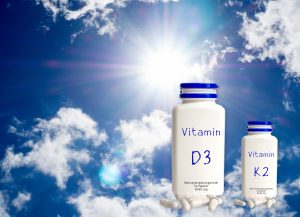Published on October 13, 2022
Video Friday: How can you know that you are getting enough of both vitamins D and K? Dr. Susan Brown, expert in bone health, explains in today’s featured video
Key Points
- Vitamin D intake is dependent on the level of vitamin D in the blood and the amount needed to reach a target level
- The recommended daily intake of vitamin K (especially as vitamin K2 or MK7) is 180-200 mcg per day from foods and supplements
- Because the amount of vitamin D needed differs from person to person, and a there is a set recommendation of vitamin K, there is no specific ratio of vitamin D to vitamin K
- Getting enough of both, as well as other co-nutrients, especially magnesium, is essential to maintain bone, heart, and overall health
 It’s Video Friday! Today’s video addresses a frequently asked question among GrassrootsHealth participants and followers – “How much vitamin K2 do I need to take with my vitamin D supplements?”
It’s Video Friday! Today’s video addresses a frequently asked question among GrassrootsHealth participants and followers – “How much vitamin K2 do I need to take with my vitamin D supplements?”
Is there such a thing as a ratio of vitamin D to vitamin K? In the video featured today, Dr. Susan Brown of betterbones.com breaks down the complicated relationship that vitamin D and K play for healthy processes in the body.
Watch the Video
After watching the video, be sure to make note of our added details below.
What’s the ratio of vitamin D to vitamin K intake? Is there a ratio?
How can you know that you are getting enough of both vitamins D and K? Here is a quick summary of what this video discusses on the topic, along with additional information and details about vitamins D and K.
Vitamins D and K are common in several ways:
- we received plenty in evolutionary times – vitamin D from sun, vitamin K from fermented foods and from bacteria on foods that produce vitamin K (times before refrigeration), plus lots of leafy green veggies
- both are fat soluble, should be taken with a fatty meal
- both play many roles in the body
Vitamin D can affect every tissue in the body; in fact, 25% of all our genes are affected by vitamin D, from heart health to immunity and mental health, etc… every system of the body is affected by vitamin D
Vitamin K is necessary for bone health, keeping calcium in bone and helps prevent calcium collection in the arteries
How much vitamin D do you need? Enough to maintain a blood level of between 45-65 or 85 ng/ml (Dr. Brown’s recommendation). The GrassrootsHealth panel of scientists recommends a level between 40-60 ng/ml (100-150 nmol/L).
- As a general rule of thumb from Dr. Brown, for every 1000 IU of additional vitamin D taken, you could possibly raise your level by 10 ng/ml (25 nmol/L) – however, the dose response for vitamin D is a curve, and everyone responds differently to intake
- Must test to know your level and see how you respond to a change in dose
How much vitamin K do you need? Some can get enough vitamin K from the diet, in foods such as leafy green veggies, fermented foods (such as hard cheeses, kimchi, natto, etc.), and from supplements; a therapeutic dose is suggested to be between 180-200 mcg MK7 (a form of vitamin K2) per day from diet and supplements
- Even smaller amounts of MK7 were found to be helpful
What should the ratio be? It will vary individually according to the amount of vitamin D needed to reach the target level in the blood
How much helps heart health? Diet studies have shown that people eating even small amounts of vitamin K (from foods such as hard cheese), even at a dose of 32 mcg per day, was enough to reduce arterial calcification and risk of death by CVD by 50%
- for every 10 mcg MK7, there was a reduction in coronary heart disease risk of 9%
- eating foods high in MK7 (Vitamin K2) see heart healthy benefits!
Make sure to get enough magnesium as well! Need to make sure the other key nutrients for calcium metabolism are also there to help keep the balance; magnesium helps prevent calcification and is essential to proper vitamin D absorption and metabolism
- all nutrients work together in the body
Final tip: make sure your vitamin D is in therapeutic range and eat fermented foods to get a bit of MK7 every day! Supplement your diet with vitamin K2 if you are missing out on these vitamin K rich foods
Check out vitamink2.org for more detailed information and research on vitamin K2
Your Nutrient Intake is an Easily Modifiable Factor to Help Improve Disease Outcomes
 Having and maintaining healthy vitamin D levels and other nutrient levels can help improve your health now and for your future. Choose which to measure, such as your vitamin D, omega-3s, and essential minerals including magnesium and zinc, by creating your custom home test kit today. Take steps to improve the status of each of these measurements to benefit your overall health. You can also track your own intakes, symptoms and results to see what works best for YOU.
Having and maintaining healthy vitamin D levels and other nutrient levels can help improve your health now and for your future. Choose which to measure, such as your vitamin D, omega-3s, and essential minerals including magnesium and zinc, by creating your custom home test kit today. Take steps to improve the status of each of these measurements to benefit your overall health. You can also track your own intakes, symptoms and results to see what works best for YOU.
Enroll and test your levels today, learn what steps to take to improve your status of vitamin D (see below) and other nutrients and blood markers, and take action! By enrolling in the GrassrootsHealth projects, you are not only contributing valuable information to everyone, you are also gaining knowledge about how you could improve your own health through measuring and tracking your nutrient status, and educating yourself on how to improve it.





